- Region
- Águilas
- Alhama de Murcia
- Jumilla
- Lorca
- Los Alcázares
- Mazarrón
- San Javier
-
ALL AREAS & TOWNS
- AREAS
- SOUTH WEST
- MAR MENOR
- MURCIA CITY & CENTRAL
- NORTH & NORTH WEST
- TOWNS
- Abanilla
- Abarán
- Aguilas
- Alamillo
- Alcantarilla
- Aledo
- Alhama de Murcia
- Archena
- Balsicas
- Blanca
- Bolnuevo
- Bullas
- Cañadas del Romero
- Cabo de Palos
- Calasparra
- Camping Bolnuevo
- Campo De Ricote
- Camposol
- Canada De La Lena
- Caravaca de la Cruz
- Cartagena
- Cehegin
- Ceuti
- Cieza
- Condado de Alhama
- Corvera
- Costa Cálida
- Cuevas De Almanzora
- Cuevas de Reyllo
- El Carmoli
- El Mojon
- El Molino (Puerto Lumbreras)
- El Pareton / Cantareros
- El Raso
- El Valle Golf Resort
- Fortuna
- Fuente Alamo
- Hacienda del Alamo Golf Resort
- Hacienda Riquelme Golf Resort
- Isla Plana
- Islas Menores & Mar de Cristal
- Jumilla
- La Azohia
- La Charca
- La Manga Club
- La Manga del Mar Menor
- La Pinilla
- La Puebla
- La Torre
- La Torre Golf Resort
- La Unión
- Las Palas
- Las Ramblas
- Las Ramblas Golf
- Las Torres de Cotillas
- Leiva
- Librilla
- Lo Pagan
- Lo Santiago
- Lorca
- Lorquí
- Los Alcázares
- Los Balcones
- Los Belones
- Los Canovas
- Los Nietos
- Los Perez (Tallante)
- Los Urrutias
- Los Ventorrillos
- Mar De Cristal
- Mar Menor
- Mar Menor Golf Resort
- Mazarrón
- Mazarrón Country Club
- Molina de Segura
- Moratalla
- Mula
- Murcia City
- Murcia Property
- Pareton
- Peraleja Golf Resort
- Perin
- Pilar de la Horadada
- Pinar de Campoverde
- Pinoso
- Playa Honda
- Playa Honda / Playa Paraíso
- Pliego
- Portmán
- Pozo Estrecho
- Puerto de Mazarrón
- Puerto Lumbreras
- Puntas De Calnegre
- Region of Murcia
- Ricote
- Roda Golf Resort
- Roldan
- Roldan and Lo Ferro
- San Javier
- San Pedro del Pinatar
- Santiago de la Ribera
- Sierra Espuña
- Sucina
- Tallante
- Terrazas de la Torre Golf Resort
- Torre Pacheco
- Totana
- What's On Weekly Bulletin
- Yecla


- EDITIONS:
 Spanish News Today
Spanish News Today
 Alicante Today
Alicante Today
 Andalucia Today
Andalucia Today
article_detail
Spanish News Today Editors Roundup Weekly Bulletin Dec 22

FEATURED ARTICLES: "No more bank charges for over-65s withdrawing cash in Spain" and "Prolific Murcia burglar arrested just in time for Christmas"
This is our 111th Editor’s Roundup Weekly Bulletin since we restarted the service post-Covid just over two years ago. Lord Nelson would be proud. You’ll have to stand on one leg while you read this one.
A quick reminder that this is the last Bulletin of the year. We will be taking two weeks off writing the bulletin, so there is no New Year’s Eve or Three Kings edition. We’ll be back with the next one on Friday January 12, but in the meantime you can still keep checking our website and social media feeds for the latest Spain news.
So, now we’ve come to the end of 2023, it’s as good a time as any to take a look back at some of the bigger news stories of the year in Spain:
2023, the year that was
The year started, as most of them do, in January with the somewhat surprising story of ‘The 4 Spanish villages that will pay expats to live there’. These were the tiny northern Spanish towns of Ponga (Asturias), Rubia (Galicia), Griegos (Aragón) and A Xesta (Pontevedra), which were offering sums of between a few hundred and up to 3,000 euros to try and attract Spaniards and foreigners to go and live there. But why? Well, basically because these are places that are being left without inhabitants. It’s what is known as ‘la España vaciada’ or ‘empty Spain’, which is the name given to the process of small rural villages slowly having their populations decimated by young people moving away and being left with only elderly people. Want to save a dying village in Spain and get paid for it, to boot? The offer still stands…
Also in January, we got a once-in-a-lifetime chance to see the so-called ‘Green Comet’, which only comes around every 50,000 years or so. Formally known as Comet C/2022 E3 (ZTF), it was nicknamed the Green Comet because of the greenish tinge it left behind it in its tail. Do you remember it? Did you get to see it?
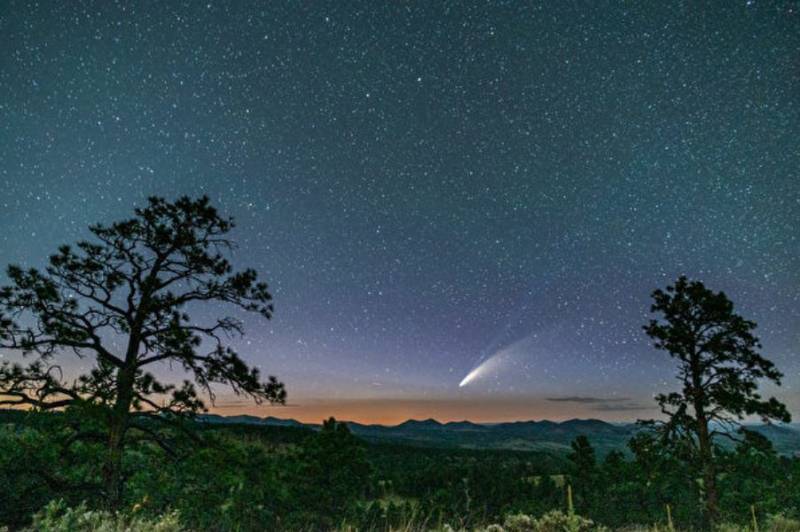
A blazing delivery of a different kind came at the end of January when it emerged that the letter bombs that had been sent to high-profile targets in Spain in late 2022, including Prime Minister Pedro Sánchez, had been sent by a white supremacist group based in Russia, on the orders of Russian intelligence officers. According to American and European intelligence officials, the apparent motive for the letter bombing campaign was to signal that Russia and its proxies could carry out terrorist attacks across Europe, including in the capitals of NATO member states, which were helping and continue to help Ukraine defend itself against Russia’s invasion, which, if you can believe it, is now 667 days old.
In March, there was fantastic news for British citizens resident in Spain as the Spanish government and the UK Embassy in Madrid finally managed to reach an agreement to allow Brits to drive again temporarily while they sorted out getting a Spanish driving licence. Brits had been banned from driving on their UK licences in 2020 due to Brexit, and many who tried to go through the process to swap their licences for Spanish ones without having to take their driving test again were unable to do so, with many applications becoming ‘lost’ or not being processed in time. Anyway, now everyone who needs one should have been able to get themselves a Spanish driving licence.
There was much terror and hullaballoo in June when police evacuated the popular Playa Aguamarina tourist beach in the Costa Blanca’s Campoamor after a 2-metre shark was spotted swimming in the water, very close to bathers. While there was widespread panic over the presence of the enormous animal, in reality it was identified as a harmless ‘Tintero’, or blue shark. It wouldn’t have posed a danger to swimmers, and in any case it washed up dead on a beach in Cabo Roig a few hours later. Experts concluded the poor thing was sick or had been injured, pointing to rising sea temperatures and the climate crisis as possible reasons for the animal having strayed from its usual feeding/breeding/migration grounds. Still, if you do see a shark in the water next time you’re swimming in the sea, best to get out just in case, but have some sympathy for the poor animal as it’s probably having a worse time of it than you are.
In July, the Directorate-General for Traffic (DGT) introduced new rules for parking campervans and motorhomes in Spain in an effort to clear up, once and for all, the difference between parking and what it classes as camping. Essentially, the new guidelines aimed to remove conflicting rules about wild camping, particularly in protected areas, in different towns, provinces and autonomous communities across the country. Basically, you’re free to park your motorhome on a public road or in a car park if you behave yourself and don’t expand out, putting down your stabilising legs, setting up awnings, cooking on a barbecue and making a nuisance. Just like any other car in a car park, really.
At the tail-end of the summer (which, admittedly, kind of feels like it’s still going on!), there was a massive and extremely destructive storm that raged across Spain on the first weekend in September. This DANA storm brought pouring rain, hail storms and gale-force winds to pretty much the entire country. Madrid and Cádiz arguably got the worst of it, with flooding in the streets and several villages becoming cut off when bridges were washed away.
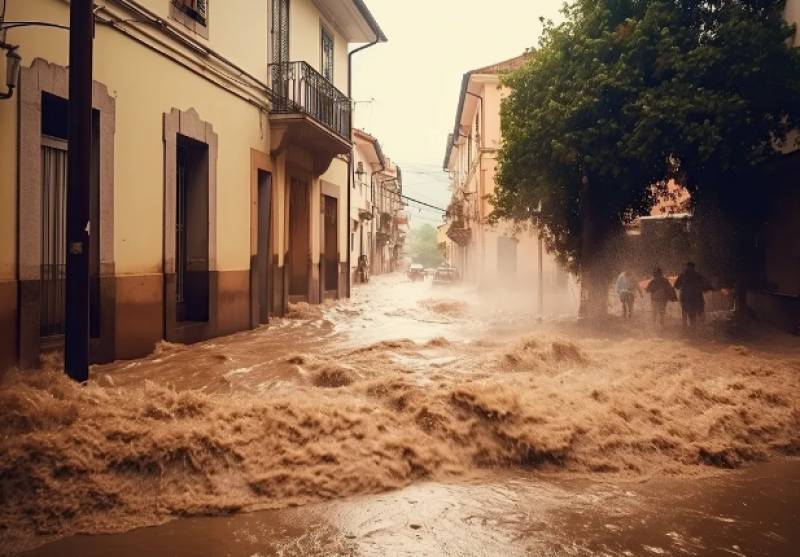
Also in September, it was revealed that, starting from 2024, the Spanish government would be increasing the retirement age to 66 years and 6 months and bit by bit going up with each successive year until it reaches the age of 67 by 2027.
The initial reports suggested that Brits travelling to Spain and other EU countries who are resident in the UK would need to get an ETIAS visa-waiver permit as of November this year. However, in September, word came down the line that the ETIAS scheme would be pushed back to 2025 because the technology just wasn’t in place yet. When it eventually does come into force, the ETIAS will require anyone travelling into the Schengen zone from outside it would need to get a special permit. For 18-70-year-olds, that includes paying a 7-euro fee. For anyone over the age of 70, it will be free.
One law that did finally come into force at the end of September, after being passed back in March, was the long-awaited Animal Welfare Law. The new regulations were billed as the flagship policy of the Socialist government and aimed to enshrine into law added protections for pets of the style which have existed in France for years now. These animal welfare rules included the requirement for all pets to be microchipped; mandatory neutering or spaying for cats by 6 months of age; certain animals being banned from being sold in pet shops; a ban on the use of animals in circuses; and guarantees for pets to be allowed in public spaces, among other things. However, the final text of the law was notable for leaving out protections for working farm dogs and hunting dogs – which may be treated in such a way as their owners see fit – and did nothing to address the long-standing cultural cruelty in Spain that is bullfighting and other events that involve that torture of bulls.
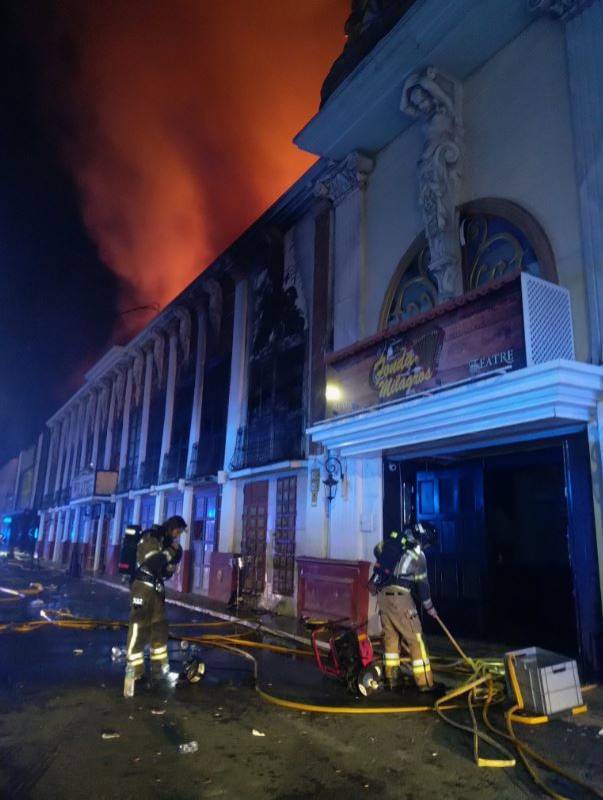 The first day of October brought the horrific story of the deadliest nightclub fire in Spain for over 30 years on October 1, when two nightclubs in Murcia caught fire and 13 people trapped inside lost their lives. It was caused by indoor sparklers/fireworks being used as part of a DJ night inside one of the clubs, but it later emerged that both the clubs had already been ordered to close down several months before. And this story is the grim gift that unfortunately keeps giving, of which more below in the ‘Murcia’ section.
The first day of October brought the horrific story of the deadliest nightclub fire in Spain for over 30 years on October 1, when two nightclubs in Murcia caught fire and 13 people trapped inside lost their lives. It was caused by indoor sparklers/fireworks being used as part of a DJ night inside one of the clubs, but it later emerged that both the clubs had already been ordered to close down several months before. And this story is the grim gift that unfortunately keeps giving, of which more below in the ‘Murcia’ section.In October, we also brought you the news of the abandoned village in Spain that is, for the second time in a year, up for sale. Little ol’ Salto de Castro in northwestern Spain’s Zamora, a veritable ghost town for the last 30 years, was sold to Toledo businessman Óscar Torres for 300,000 euros last year. He promised to do the town up and make it a viable place for people to live, shop and work, and then, not 12 months later, put the place back on the market for a cool 580,000 euros, almost double what he paid for it. Still seems like a steal, but Spanish property portal idealista estimated that it would take another 2 million euros to make the village 100% workable and profitable.
In November, the Spanish government finally got a President, and it was the same one who had been in power for 4 years already. All it took was nearly 6 months of negotiations following the inconclusive general election back in July and some incredibly controversial concessions to minor coalition partners. Let’s not get into it again.
 Instead, let’s get into the announcement of the new overnight train that would connect Spain and Europe, which also came out in November. The company Nightjet said it had plans to launch a Barcelona-Zurich luxury nocturnal train starting in December 2024. Cool, huh?
Instead, let’s get into the announcement of the new overnight train that would connect Spain and Europe, which also came out in November. The company Nightjet said it had plans to launch a Barcelona-Zurich luxury nocturnal train starting in December 2024. Cool, huh?Finally, we couldn’t leave out our old favourite, the airport news. Murcia’s Corvera airport, you will remember, had new flights to Madrid and Barcelona that started this December, and will have more new flights starting up for the 2024 summer season, including Porto in Portugal. Elsewhere in Spain, there will be new flight routes starting next year, including connections between Alicante and Southampton, Newcastle, Belfast, Munich, plus airports in Sweden and Denmark. Ryanair will be doing flights from Vigo (Galicia) to the London airports of Gatwick, Luton and Stansted, while Norwegian will have lots of connections between Scandinavian countries and Barcelona, Palma de Mallorca, Málaga and more.
Of course, there have been loads more stories, big and small, over the course of this year in Spain which have affected our humble foreign community and plenty that are continuing stories which will carry on having an effect for us into next year, too. Alas, we don’t have the space to go into them all here.
Murcia
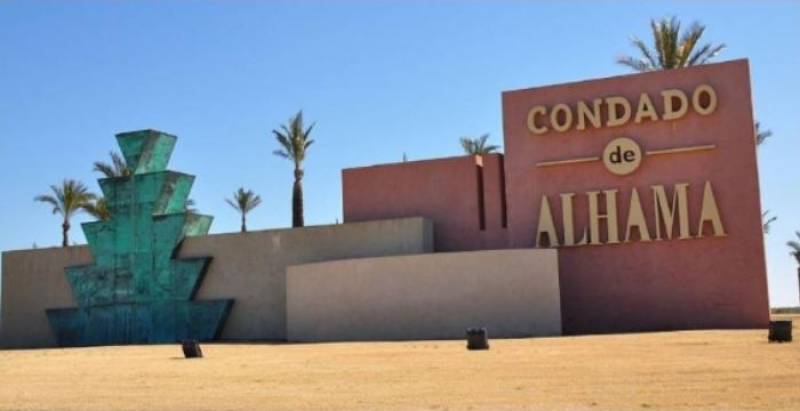
One of the biggest stories to emerge this week in the Region of Murcia is the revelation that there have been over 50 thefts, break-ins and attempted robberies on the Condado de Alhama Golf Resort in the last few months, and police took that long to arrest the culprit despite knowing exactly who it was.
The Condado resort is normally a safe and quiet sort of place where crime sprees are rare. So it’s no surprise that residents are extremely perturbed by what has been happening on the urbanisation since last June.
It is mainly homes on La Isla and the Penthouses, two areas of the resort, that have been targeted by the thief, who has broken into several properties and taken valuable goods such as golf clubs, TVs and bicycles.
The resort has its own 24-hour security team, of course, and they quickly managed to identify the robber. In fact, one local who chose to remain anonymous to prevent their home from being targeted said that security “caught him at least twice”. The problem is that they have no powers to arrest anyone. Only the police can make arrests, and they simply would not, despite frequent assurances that they would get around to it.
Part of the reason the Guardia Civil weren’t been able to act faster, though, is a lack of reporting of break-ins and crimes on the part of victims. For foreigners living on the resort, going to make a police statement means travelling all the way to the police station and, in the case of people who don’t speak Spanish very well, taking a translator with them.
At the same time, some of the victims have been holiday home owners who were not physically in Spain at the time their homes were robbed. For them, it is much harder to be able to report the crime to police and no one can do it on their behalf, not even a keyholder. As a result, many of the crimes go uninvestigated.
Other resorts and urbanisations with a high percentage of foreign citizens living there and people who are only around for part of the year experience similar problems. The best advice is, despite the nuisance that making a police report in a Spanish police station is, it is worth doing it to prevent you and your neighbours from being targeted by thieves time and again while these criminals get away with – well, not murder but everything short of it – sometimes for months on end.
Thankfully, this Thursday, the Guardia Civil finally made an arrest of a man living on La Isla who they say was “connected to” the robberies. They didn’t go so far as to say he was definitely the guilty part, but even so locals are hopeful and it comes as a welcome early Christmas present all the same.
In Murcia city, new details have emerged about the nightclub fire tragedy that cost the lives of 13 people back in October. In a report issued by Murcia City Council, the Fire Fighting and Rescue Service has revealed two and a half months after the incident that the emergency exits of the discotecas that burned down were shut up with padlocks.
It appears that firefighters had trouble accessing the Teatre nightclub through the back emergency door on the morning of the fire – and presumably anyone trying to escape from the inside would have had trouble too – because a concertina folding grille like the kind used to shutter up shops at night had been drawn across the fire exit and locked with not one but two padlocks.
The horrendous details of this tragedy continue to emerge and unfortunately this is likely not the last we hear of this, the deadliest nightclub fire ever in the Region of Murcia.
Sticking with crime, still, and pranksters have led to over 1,000 students and members of staff from the King’s College British School in Murcia being evacuated after claiming there was a bomb in the school.
It happened last Friday, really, but there were more schools that received similar alerts this Monday morning. King’s College Alicante and King;s College Madrid were both affected, as was the Lycée Français Institute in Alicante and other schools in Málaga, Pontevedra, Tenerife, Reus, Tarragona, Villareal, Castellón and Zaragoza. The MO was similar in all cases, with the schools receiving an email first thing in the morning, just as the school day was starting, warning them of the presence of a bomb.
Even after the first few turned out to be hoaxes, the schools still had to be fully evacuated and bomb squads called in to do a thorough search of the premises before students could go back in.
On a more crime-free note, several charities in Camposol were honoured by a visit from the British Vice Consul in Spain and other consular staff. Vice Consul Sarah Munsterhjelm went over to Mazarrón to meet staff from MABS Cancer Support Foundation, Age Concern Costa Cálida, the Royal British Legion in Murcia and FAST/CST Camposol, which provides a vital first response in medical emergencies until ambulances arrive.

As the consular team reported back after its visit, all of these charities are struggling to keep their services going due to lack of volunteers, so if you think you could spare a few hours a week to lend a hand, please do reach out to one of these charities (or any other local charity in your area that takes your fancy!) as every little helps.
Plenty going on in Murcia over the Christmas holidays. Check out our Events Calendar to see what’s on near you:
Spain
The big day is just around the corner and while most people will have the Christmas shopping done by now, odds are that one of two will have to nip out to the shops for some last-minute supplies. Here in Spain, Christmas Eve and January 6, Three Kings, are the main celebrations but in honour of the season, many supermarkets will operate reduced opening hours over the next couple of weeks.
In general, the main stores like Alcampo, Lidl and Aldi will close their doors on December 25, as well as on New Year’s Day and January 6, but the German chains, along with Mercadona, will stay open until 3pm on Christmas Eve, giving shoppers plenty of time to stock up.
But if you miss the window, remember that Boxing Day isn’t actually a holiday in Spain so everything should be back open for business on the 26th. You can find a full list of the Christmas and New Year opening hours here, but since hours can vary depending on the location, it’s always best to check the supermarket’s website to be sure.
 There’s no escaping the fact that Christmas is an expensive time of year so it will come as welcome news that the Spanish government plans to scrap bank commissions for those who withdraw cash at branch counters. The measure should be implemented by the end of the year – in fact, many financial institutions have already done away with these charges – but it will only apply to people over the age of 65 and those with disabilities.
There’s no escaping the fact that Christmas is an expensive time of year so it will come as welcome news that the Spanish government plans to scrap bank commissions for those who withdraw cash at branch counters. The measure should be implemented by the end of the year – in fact, many financial institutions have already done away with these charges – but it will only apply to people over the age of 65 and those with disabilities.The reasoning behind this is that the Organisation of Consumers and Users (OCU) believes that these days, financial services in Spain are unfairly geared towards younger people who tend to use digital banking, which is normally free. On the other hand, older customers usually opt for face-to-face and over-the-counter procedures, which ends up costing them more.
Unfortunately, flight delays and disruptions have become par for the course but nothing could have prepared a plane full of British passengers for the hellish ordeal they were faced with last weekend.
The Ryanair flight from Tenerife to Manchester had only been in the air for 30 minutes when the pilot realised there were some “technical issues” with the aircraft and was forced to return to the Canary island. Since it was a late evening flight, the airline informed passengers they wouldn’t be travelling home until 8am the following morning.
However, much to their dismay, travel time was pushed out further and further: initially, to 1pm on Sunday December 17, then 4pm and finally 7pm. Eventually, Ryanair made the call to put passengers on alternative flights, but many were forced to fly to Liverpool and face a coach ride from there to Manchester.
Speaking from Tenerife airport at the time, Briton Michelle Hamilton said that most of her fellow travellers were “upset and angry” at the lack of communication from Ryanair.
“In all fairness they got us back to Tenerife rapidly – but from then it was shocking. There are so many people here, including a young couple with a 10-month-old baby on special milk and they are running out,” she said.
“It’s so poor, we have been in the airport all day. I am young and fit enough to manage but people have no money and have been left all day from morning until now.”
On the plus side for anyone flying with Iberia this Christmas, the Spanish government has decided to step in and act as an intermediary in the ongoing negotiations with Iberia to avoid the planned baggage handlers’ strike on key holiday travel dates. Just like happened the last time baggage handlers threatened industrial action on the December long weekend, it has been halted at the last minute in favour of negotiations.
Alicante
Residents of the Alicante town on Sant Vicent del Raspeig lived through their very own nightmare before Christmas this week when the Baby Jesus statue was stolen from the municipal Nativity scene and held to ransom.
It sounds unbelievable, but the masked thieves actually created a special social media account called ‘Kidnappers of San Vicente’ and threatened to “harm” the blessed child if the police didn’t hand over 2,000 euros for his safe return.

Posing in black balaclavas and hoodies, the video shows the two young men sitting on a bed with Baby Jesus, who had been covered with 10- and 20-euro notes. The brazen men also filmed the entire robbery and posted the footage on their page. In the video, a young man can be seen hopping out of a car, walking up to the Nativity and snatching the figure. When another passenger shouts, “My goodness, a car is coming,” he throws the Baby Jesus inside and speeds off.
Although the robbers altered their voices and one of them pixelated his face, the authorities were following several leads very early on and quickly made good on their promise of a “prompt resolution.”
Within hours, the two alleged thieves were arrested. Needless to say, the authorities didn’t hand over any money and Baby Jesus has been safely returned to his proper place in the Sant Vicent del Raspeig Nativity Scene.
 For a long time now, the residents of Orihuela Costa have felt like the poor relations of their namesake city, despite being the area’s most popular tourist destination. The white coast has achieved international fame for its many extravagant celebrations like St Patrick’s Day and the La Zenia Christmas Day beach party and now, locals have banded together to create their very own Orihuela Costa festival committee.
For a long time now, the residents of Orihuela Costa have felt like the poor relations of their namesake city, despite being the area’s most popular tourist destination. The white coast has achieved international fame for its many extravagant celebrations like St Patrick’s Day and the La Zenia Christmas Day beach party and now, locals have banded together to create their very own Orihuela Costa festival committee.The idea is to create an official calendar of festivities for the area, beginning with a larger-than-life Carnival parade that’s scheduled for February 17 next year to kick off the party season.
Following the renowned St Paddy’s Day in Cabo Roig, which is one of the biggest in all of Europe, the commission has suggested a local celebration of the Orihuela Costa with a range of events between June 23 and 30, “with activities in all the neighbourhoods, thus seeking the involvement of all residents.”
It doesn’t stop there, as the association wants to pack the calendar full of year-long events, continuing on October 31 with a special Halloween procession organised in conjunction with the La Florida Merchants Association and local residents of Las Filipinas.
According to a spokesperson from the Cabo Roig and Lomas neighbourhood association, the plan is to close out the season with the Christmas beach party, but they haven’t ruled out adding even more events to the calendar throughout the year.
Remember to join the Costa Blanca What’s On and Where to Go Facebook group for info on all theses events and more in Alicante province!
Andalucía

There are some places in Spain which are, shall we say, not exactly renowned for the quality of their drinking water. Nine times out of ten, the tap water is safe to drink in these places, even though a high limescale content means it tastes a bit funny.
Anyone who has ever visited Almería will know that this is one such place, but in one particular area just to the west of the provincial capital city, the tap water has actually been declared unfit for human consumption in the last few days due to the presence of radioactive material. This is essentially in the Pescadería neighbourhood in the western side of the city of Almería and the picturesque seaside town of Aguadulce that lies just beyond it.
While most of Almería is served by water from desalination plants, the Barrio de la Pescadería and Aguadulce get their water from the ground wells known as the ‘Pozos de Bernal’. Water coming from those wells, which is tested regularly by health authorities, was recently found to contain unacceptable levels of “radionuclide values” and as such cannot be drunk or used for cooking. It can, according to the Territorial Delegation in Almería, be used for cleaning, washing dishes and showering.
But why is the water suddenly radioactive, and will people start dying if they drink it? The explanation is nothing so sinister as a chemical spill, say the Health authorities. Rather, everything is radioactive to some tiny extent – plants, animals, even people. What has happened in Almería’s natural aquifers is that the presence of natural radioactive elements going into the water from the rocks and minerals that surround it has been intensified due to the low water level.
So basically, the lack of rainfall and the low water reserves – as is being seen in Málaga and other parts of Spain, too – is having a knock-on effect and meaning the little water that is left is made unsuitable for humans to drink. True, you’d have to drink a lot of it over an extended period of time for any adverse effects to make themselves known, but drinking water all day, every day is pretty much the definition of a human being.
Scientists have now been tasked with coming up with a solution to reverse the radioactivity of Almería’s water and prove that it’s safe for three consecutive months before it is declared okay for people to drink again. Until such time, the Ayuntamientos of Almería city and Aguadulce are handing out free and unlimited (within reason) fresh drinking water from tanker trucks that are available to each affected neighbourhood at certain specific times of day.
Indeed, the lack of rainfall has been confirmed in the data released by a recent study, which found that Andalucía’s dammed water aquifers are currently storing just 20.14% of their total water capacity, which is 940 hectometres cubed (hm3) of water less than this time last year.
The water reserves that serve Seville, Córdoba, Granada and Jaén have actually risen slightly on last year, but the massive losses in the remaining provinces – Huelva, Cádiz, Málaga and Almería – mean that overall the community is in a state of water shortage.
Some Costa del Sol towns, such as Fuengirola, are subject to water cuts, while the water pressure in others has been decreased by 20% to help save supplies. The spokesperson for the Andalusian Government and Minister of Sustainability, Ramón Fernández-Pacheco, explained in a press conference this week that if it does not rain in Andalucía between now and summer there may be “serious supply problems” in some provincial capitals and large municipalities.
Also in Málaga province, thirteen people were injured when two trains crashed into each other in El Chorro Alvaro last weekend. One of the carriages, which was thankfully not carrying any passengers at the time, derailed and the 250 people travelling on the Málaga to Sevilla line had to be evacuated shortly after 9.30pm.
Three of the thirteen people injured in the accident were children, and two people had to be transferred to the Valle del Guadalhorce hospital for treatment. Many more passengers were treated for shock by medics at the scene.
While the cause of the incident is still being investigated, initial indications point towards human error when one of the train drivers apparently skipped through a stop sign and into the station, ploughing straight into the train sat stationary at the platform.
Finally, the municipality of La Algaba in Seville has implemented an innovative strategy to making drivers slow down when passing through the town by installing traffic radars that play on drivers’ emotions rather than automatically fining them.
With the new traffic radars, motorists who drive through La Algaba will be greeted with a smiley face or a sad emoticon, depending on their speed. So far, three of these radars have been placed on streets in the centre of the town. When a car goes past, a green happy face flashes up if they are driving within the speed limit, which in this case is 30 kilometres per hour, but someone who is speeding gets a red frowning face.
Not only does it make it instantly and viscerally obvious whether drivers are going too fast or not, the scheme is also aimed at ensuring that even small children in the car can understand if the rules are being broken or not. In turn, or so goes the theory, this will prompt parents to be more careful when driving.
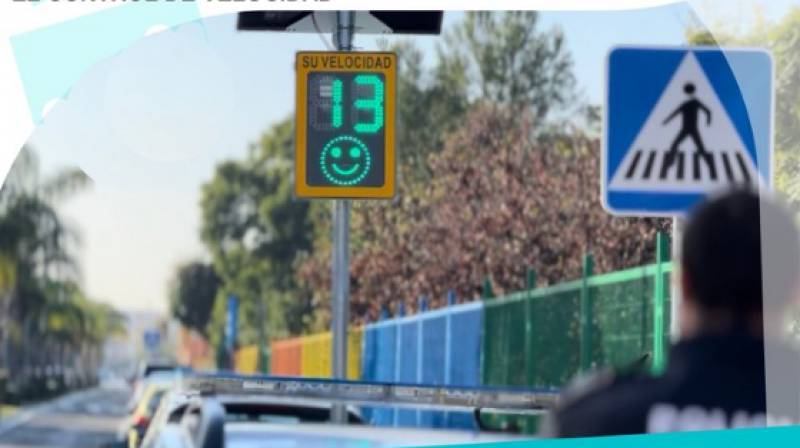
You may have missed…
- The legal loophole that lets you get around the 90-day rule in Spain.
There is a little-known legal loophole called a ‘Prórroga de Estancia’ by which it is actually possible to remain in Spain for longer than 90 days, but the applicant must be able to prove exceptional health or humanitarian circumstances. - Murcia bans the use of mobile phones in schools.
Murcia has become the latest region in Spain to prohibit the “improper” use of mobile phones in its classrooms. - Wanted British killer arrested in Alicante.
Alicante National Police have arrested a British man wanted in relation to the murder of his partner back in 1990. The fugitive skipped bail in 2015 and disappeared for years before resurfacing in the Costa Blanca city of Torrevieja last month. - Father Christmas fined by traffic cops in Murcia.
Santa Claus was stopped by police in Murcia city and handed a traffic fine this week; officers stopped four people on Gran Vía dressed as Santa and his elves who had turned their vehicles into Christmas sleighs, adding illegal elements that they said endangered other road users. - This is why the Iceland volcano eruption will not shut down flights in Europe this time around.
The eruption of the Eyjafjallajokull volcano in April 2010 caused the largest closure of European airspace since World War II due to massive ash clouds, but scientists say this eruption is much different.
That’s all for this year. Thank you so much for all your support throughout the year. Have a very jolly holiday season and we’ll be back next year for more!
Merry Christmas and a Happy New Year!
Find more information by AREA, TOWN or URBANISATION .....
Cabo de Palos
Cartagena
El Carmoli
Islas Menores and Mar de Cristal
La Manga Club
La Manga del Mar Menor
La Puebla
La Torre Golf Resort
La Union
Los Alcazares
Los Belones
Los Nietos
Los Urrutias
Mar Menor Golf Resort
Pilar de la Horadada
Playa Honda / Playa Paraiso
Portman
Roldan and Lo Ferro
San Javier
San Pedro del Pinatar
Santa Rosalia Lake and Life resort
Terrazas de la Torre Golf Resort
Torre Pacheco
Cartagena
El Carmoli
Islas Menores and Mar de Cristal
La Manga Club
La Manga del Mar Menor
La Puebla
La Torre Golf Resort
La Union
Los Alcazares
Los Belones
Los Nietos
Los Urrutias
Mar Menor Golf Resort
Pilar de la Horadada
Playa Honda / Playa Paraiso
Portman
Roldan and Lo Ferro
San Javier
San Pedro del Pinatar
Santa Rosalia Lake and Life resort
Terrazas de la Torre Golf Resort
Torre Pacheco
Aguilas
Aledo
Alhama de Murcia
Bolnuevo
Camposol
Condado de Alhama
Fuente Alamo
Hacienda del Alamo Golf Resort
Lorca
Mazarron
Puerto de Mazarron
Puerto Lumbreras
Sierra Espuna
Totana
Aledo
Alhama de Murcia
Bolnuevo
Camposol
Condado de Alhama
Fuente Alamo
Hacienda del Alamo Golf Resort
Lorca
Mazarron
Puerto de Mazarron
Puerto Lumbreras
Sierra Espuna
Totana
Abanilla
Abaran
Alcantarilla
Archena
Blanca
Corvera
El Valle Golf Resort
Hacienda Riquelme Golf Resort
Lorqui
Molina de Segura
Mosa Trajectum
Murcia City
Peraleja Golf Resort
Ricote
Sucina
Abaran
Alcantarilla
Archena
Blanca
Corvera
El Valle Golf Resort
Hacienda Riquelme Golf Resort
Lorqui
Molina de Segura
Mosa Trajectum
Murcia City
Peraleja Golf Resort
Ricote
Sucina
Urbanisations
CamposolCondado de Alhama
El Valle Golf Resort
Hacienda del Alamo Golf Resort
Hacienda Riquelme Golf Resort
Islas Menores and Mar de Cristal
La Manga Club
La Torre Golf Resort
Mar Menor Golf Resort
Mazarron Country Club
Mosa Trajectum
Peraleja Golf Resort
Santa Rosalia Lake and Life resort
Terrazas de la Torre Golf Resort
La Zenia
Lomas de Cabo Roig

Important Topics:
CAMPOSOL TODAY Whats OnCartagena SpainCoronavirusCorvera Airport MurciaMurcia Gota Fria 2019Murcia property news generic threadWeekly Bulletin
CAMPOSOL TODAY Whats OnCartagena SpainCoronavirusCorvera Airport MurciaMurcia Gota Fria 2019Murcia property news generic threadWeekly Bulletin
Contact Murcia Today: Editorial 000 000 000 /
Office 000 000 000
















